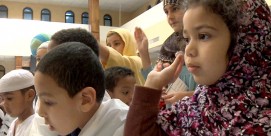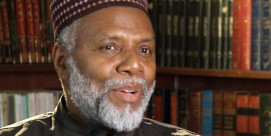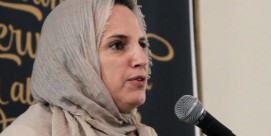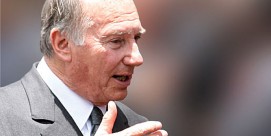In This Episode << SLIDE LEFT TO SEE ADDITIONAL SEGMENTS
Karen Armstrong Interview
Read a special Religion & Ethics NewsWeekly interview with scholar and author Karen Armstrong. She has written many books on religion, including THE BATTLE FOR GOD and ISLAM: A SHORT HISTORY:
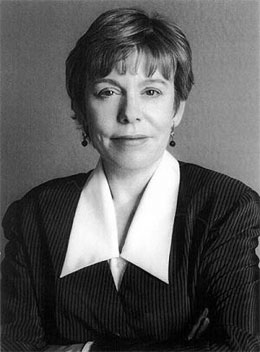 On America’s response to 9/11:
On America’s response to 9/11:
That’s complicated, of course, because America’s a huge place, and it will vary in different parts of the country, different neighborhoods and different cities. But there has been a commendable desire on the part of American people to understand Islam.
An extraordinary thing happened after 9/11. The American people descended on the bookstores and swept everything on Islam off the shelves. That is very positive. It didn’t happen in the United Kingdom. British people weren’t remotely interested in finding out more about Islam, but Americans are curious in that way, and when I went round lecturing, people impressed me with their tough-minded desire to try to come to terms with all this.
That said, though, there’s still a lot of hostility, and for a lot of people, you don’t even have to scratch the surface. The hostility is still there, and a lot of it is deeply traumatic. America has been shocked; this is post-traumatic stress syndrome, and this will be with us for some time, and people are speaking out of pain, dislocation, and bewilderment. Americans have found for the first time in their history, really, that they, too, like the rest of the world, are on the front line.
On improving interfaith relations:
We’ve got to carry on trying to understand. It’s no good falling back on old patterns of bigotry, because we have enough to be worried about, goodness knows, without creating extra bogies to concern ourselves. It’s very important that people see what Islam is, and what it is not, and see these acts of violence, especially the September 11 acts of violence, as totally unrepresentative of the Islamic tradition, and so the more education that goes on, the better — education on all sides.
Muslims, too, have got to change some of their textbooks to give their children a better, more balanced view of Jews and Christians. Christians have got to change their textbooks. I’m still shocked by the way the Pharisees are presented in some school textbooks, giving children a very distorted notion of Judaism.
All of us have got a struggle on our hands. This has been a terrible wake-up call. We can’t afford bigotry. We live in one world, whether we like it or not, and we cannot afford to live in ignorance of one another any longer.
On Islam and America:
We often think of Islam as a rather exotic, eccentric, bizarre, slightly barbarous creed that has really nothing whatever to do with us. But, in fact, it’s profoundly in tune with the whole American and western ethos.
The heart of Islam beats with the heart of the American people. The passion that Islam has for equality — Islam is one of the most egalitarian religions I know and has always lived out its egalitarianism. It’s at its best historically when it has had egalitarian forms of government, and [it is] unhappy with authoritarian forms of government, as it has now. That’s one of the reasons Islam is unhappy, because it has a lot of despots and bad government and tyrannical government, some of which are supported by the United States and the West generally.
Similarly [there is] its passion for justice. The bedrock message of the Qur’an is not a doctrine but a simple command that it’s right to share your wealth equally, bad to build up a private fortune selfishly, and good to try to create a just and decent society where poor and vulnerable people are treated with respect. That is the bedrock message of the Qur’an, and this is surely what we mean when we talk about decent society and our aspirations in the West.
And Islam is a religion of peace. Like all the great world traditions, it recoils in horror from the violence of the world and struggles through to a position of peace. You can see that in the life of the Prophet Muhammad. The word “Islam” is related etymologically to the word “Salaam ” — peace.
On the challenges facing American Muslims:
The whole experience of building an Islamic community in a country where Muslims are a minority is a new experience for Muslims. The whole of Islamic law is structured around a place where society is Islamic. There are leading clerics nobody hears about in the West; the only person we hear about is Osama bin Laden, but there are many, many clerics more important than he, some of whom are trying to work out ways to enable Muslims to develop this rich religious life, [ways Muslim law] can be adapted to conditions where you’re living in a minority. Muslims are keen to do it, but it’s difficult.
There are Iranian Muslims, Turkish Muslims, Arab Muslims, Southeast Asian Muslims, Chinese Muslims, Afro-American Muslims — and all these bring different things to Islam. It’s quite difficult to form a united community out of all this, especially in a time of tension, in a time when people naturally feel defensive about their faith, when some of them are being attacked, when some of them fear for their lives. Many of them are refugees from oppressive regimes such as Iraq. Then, when they experience hostility — graffiti saying “Muslims go home” — they naturally feel deeply insecure.
It’s very difficult to be creative when you feel under threat. We all tend to be belligerent in that case, or to resist things, rather than open ourselves out to new experiences. So that will be their challenge.
There’s also the difficulty of being an American and yet not really feeling very happy about American foreign policy in their own former countries, and that is a problem. There are Americans who also share this perspective, so Muslims are not alone in that.
On what federal agencies need to understand about American Muslims:
They should not imagine that just because somebody has a Qur’an in their luggage they are necessarily suspect. The FBI should not imagine that any Muslim is likely to be a terrorist, that they belong to a religion that will inspire or incite them toward some form of terror, violence, or disaffection from the United States. They should educate themselves about Islam and realize that the people who committed these evil atrocities on September 11 were very peculiar Muslims indeed — Muslims who were drinking vodka before they got on the doomed aircraft at 7:00 in the morning. They weren’t trying to “blend in”; they were sticking out like sore thumbs; Muslims who went to nightclubs, who consorted with women in Las Vegas. These were odd Muslims, and if they can break a Muslim law like drinking, then they can break other laws, too, like the law against killing innocent people and committing acts of terror. Richard Reed, the British shoe bomber, was a convert to Islam, and his imam in South London said they had to exclude him from the mosque because he came in saying, “Find me a jihad.” Here was somebody who joined up because he wanted a fight. Similarly, an Australian boy picked up in Afghanistan at the same time as John Walker Lindh — they were drifters. They went from one group to another and finally ended up in Islam. These are not ordinary Muslims who go regularly to the mosque, who hear the basically peaceful message of the Qur’an. These are people who are spoiling for a fight, who are angry, who are not living good Muslim lives in other respects and are not characteristic of the Muslim people as a whole.
On the religious tolerance of Americans for Islam:
I think they’re trying. [There is] the fact that President Bush made it his business, as did Prime Minister Blair, after the atrocities, to say that this was not going to be a war against Islam. President Bush made sure he had a Muslim beside him in the service of mourning. All this was important. This was new; this didn’t happen at the time of the Gulf War or in Britain at the time of the Salman Rushdie crisis. There’s a long way to go, but it was a start.
There are a lot of Americans out there [who are], again, hurting, wounded, winded, shocked, and spoiling for a fight, who don’t want to hear the truth about Islam because they’re fighting too many ghosts and horrors. It’s always tempting to want to find a quick target, but it won’t help in the long run. If we encourage the smallest degree of bigoted attitude towards Islam, we are creating further problems for ourselves, further acts of terror.
America is a very pluralistic country; it’s had a tradition of overcoming great hostility to other religious groups in the past — Catholics, for example. At the time of the War of Independence against Britain, only one percent of Americans were Catholics, and they were very much personae non gratae, and seen as a sort of fifth column. It would have been unthinkable that one day they would have a Catholic president, and of course they did with John F. Kennedy. Now Catholics are accepted as part of the scene, though they’re having their own problems at the moment.
The same can happen to Muslims. Someone was saying to me recently that nearly all our former enemies end up on the White House lawn. Nelson Mandela, who’s now regarded as a saint, was a couple of decades ago touted by the American administration as a communist and a terrorist. Arafat has appeared on that lawn. Now, I’m not going so far to say, goodness me, that Bin Laden will be there — of course not. But we can overcome these horrors, and we must work to do so, because if we don’t, we will be betraying the traditions that we hold most dear about ourselves.
We like to think of our western society as being compassionate, tolerant, respectful of human rights, kinder than these other oriental despotisms, as we like to imagine them. But if we start stigmatizing Muslims either at home or abroad, then we will be betraying the culture, and we’ll ultimately lose ourselves, and that’s a prospect that’s too awful to imagine.
On the need for Islam to have a reformation:
People who talk about the need for Islam to have a reformation, “as we did” in the 16th century, show a great ignorance of Islam and the Protestant Reformation. Islam has had a constant series of reformations; you can trace most of them right back to the 13th, 14th century, even before. They went back to the basics, got rid of all recent accretions, and tried to get back to the original spirit of Muhammad, just like Luther and Calvin.
There was nothing special about Luther and Calvin. People who think there was something special about the Reformation are ignorant about world history. Luther and Calvin were typical premodern reformers, going back to basics, getting rid of medieval accretions, and trying to meet the conditions of their time, in their case the changing conditions of early modernity.
The Reformation in Europe was in many ways a complete disaster. It resulted in a great deal of killing — Catholics and Protestants killing one another. It was not a reformation that was handled well. It divided Europe permanently — we’re still trying to get it back together again. When I look back on all the reformations I’ve studied in Jewish, Christian, and Muslim history, that must be the worst and most ineptly handled.
People imagine that the Reformation somehow changed Christianity and therefore changed the ethos of Europe. The Reformation came about simply because there were changing conditions in Europe. Modernity was beginning, and people could no longer be Christian in the old medieval way. The Reformation was a product of modernization.
Muslims have to modernize their societies, and that took us three or four hundred years; they’ve only just begun. It’s a long, painful, difficult process. They are having to do it far too quickly, and they are experiencing many of the same traumas we did in Europe when we were modernizing: wars of religion, revolutions, reigns of terror, exploitation of women and children, despotisms, basic alienation and anomie as conditions change and nothing new has come to take their place. So we’re watching people in the developing countries, in some part of the Islamic world, going through a process that we went through ourselves, but we’ve forgotten. We think we’ve been home and dry for so long, so we think that anybody can just create a democracy in no time at all, forgetting that it took us hundreds of years to develop both our secular and our democratic institutions.
On the lessons of 9/11 for people of faith and American Muslims in particular:
I know what lessons I’d like them to have learned — that we now live in one world; that what happens in Gaza or Afghanistan or Arabia today will have repercussions in the United States or London tomorrow; that America is no longer protected by its great oceans or wealth or military prowess. Look what happened to the World Trade Center and the Pentagon, the symbols of what we thought would give us absolute security in the western world.
We have now entered the community of suffering. It is a religious opportunity, because the great religious teachers all say that unless our hearts are awakened to compassion, we cannot begin our religious quest.
Now the people of America know in their own hearts what it might have been for the people of Rwanda, Lebanon, Bosnia to have suffered as they did. This could make for a more compassionate form of religion, a religion that’s not concerned just with dogma, identity, or keeping the various institutions going, but that is concerned above all with compassion, the one litmus test of every single one of the world’s great traditions. Christianity, Judaism, and Islam all insist that there’s no point in being religious or saying your prayers unless you are acting justly and honoring the sacred rights of your fellow human beings.

